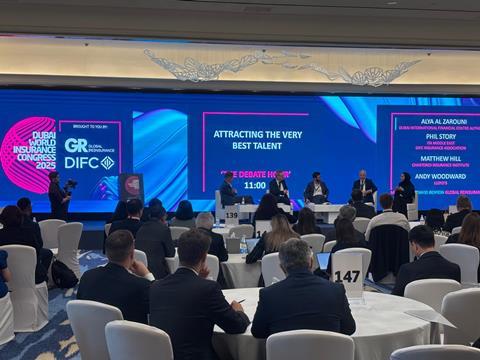Dubai is becoming a magnet for international talent, but there is more to do, whether through professional development or the use of innovative technology, panellists emphasised at DWIC 2025.

At the Dubai World Insurance Congress (DWIC 2025) this week, a panel of senior figures from the region’s re/insurance and financial services sectors called for a more deliberate, collaborative approach to attracting and retaining talent in Dubai’s growing insurance hub.
The session, titled “Attracting the very best talent,” heard that while Dubai’s reputation has evolved to make it increasingly attractive to international professionals, more work is needed to boost talent pipelines, promote professional development and improve retention.
“The perception of Dubai has completely changed,” said Andy Woodward, regional head for Lloyd’s in the Middle East and Turkey. “You don’t have to sell Dubai to people in London anymore. We’re seeing more and more senior brokers and underwriters moving here, bringing with them a wider portfolio that extends beyond the region.”
However, Woodward acknowledged a major challenge: the small size of many firms in the Dubai International Financial Centre (DIFC) means they often lack the capacity to onboard and train new graduates. “Everyone wants their talent up and ready to go,” he said. “As a community, we’re going to have to own that pipeline.”
Building purpose and professional pride
Matthew Hill, chief executive of the Chartered Insurance Institute (CII), stressed the importance of embedding purpose in professional development. “Creating a career is hard,” he said, “but the hardest thing of all is creating a sense of professional purpose. Insurance plays a fundamental role in society—without it, the world doesn’t function. We need to do more to transmit that to the next generation.”
Hill warned that the insurance profession too often undersells itself. “When I walk into a room full of barristers, I know it in five minutes—they’ll all tell me,” he said. “Walk into a room of insurance professionals, and I might be there an hour and still not know. That humility is noble, but it works against us in promoting the value and richness of what we do.”
Phil Story, EMEA senior executive officer of Investors Trust and chair of the DIFC Insurance Association, agreed with the CII’s leader and pointed to efforts already underway to close the gap. “We make sure everyone on our team is doing qualifications every year—CII, CISI, or others. We’re also trying to reach local students through internships and summer placements,” he said, describing how one former intern is now a CEO in Africa. “You’ve got to catch them young and show them what insurance really is.”
Local talent, global reach
While much of the focus was on luring professionals from mature markets, the panel strongly emphasised that local development should go hand in hand with international recruitment.
Alya Al Zarouni, chief operating officer of the DIFC Authority, said, “Our mandate includes supporting the local community with professional development—creating a roadmap for both UAE nationals and expatriates.”
Zarouni highlighted the DIFC’s role in growing the wider ecosystem. “We’re expanding our footprint to create more jobs, and we’re enhancing the ecosystem that brings companies, government, education and innovation together. It’s not just about attracting talent—it’s about becoming a magnet for it.”
Hill echoed that sentiment: “You need technically competent individuals with the right standards and values, wherever they come from. It’s about having pathways flexible enough to accommodate the diversity of backgrounds and experiences.”
Tech as a talent magnet
Technology emerged as both a strategic advantage and an area requiring continued focus. Speakers agreed that while firms must compete on compensation and career development, offering access to innovation was increasingly important—particularly for younger professionals.
“Insurance is a tech business,” said Hill. “It’s about data, analysis, science and engineering. If you want a career in tech, come to insurance. But we’ve got to do a better job of telling that story.”
Woodward praised the Lloyd’s Lab as a successful incubator that had already exported talent to Dubai. “It’s become an ambassador for Lloyd’s globally. When startups graduate, one of the first places they look to expand is here.”
Zarouni also noted the DIFC’s growing emphasis on digital innovation, including fintech and AI-focused events and training. “We’re creating an environment where financial services and innovation businesses learn from each other. That’s where real development happens.”
Story summed up the broader opportunity by reflecting on the city’s appeal to new entrants: “A young American came into DIFC straight out of university and was amazed by the diversity, with so many languages being spoken all around him. Everyone is here for business, from all over the world. That kind of environment is infectious.”










No comments yet